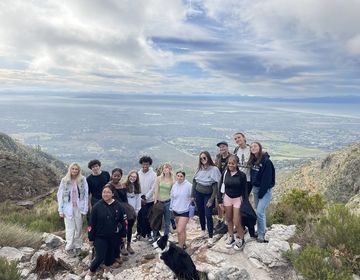Intersectionality in SA - Caleb Dunson
Kimberle Crenshaw developed the theory of intersectionality, in which she argued that the social categories we use to create our identity also work to establish the levels of discrimination that we face. As a young black man from a middle class family, I have faced discrimination because of the color of the skin, but have experienced a level of privilege because I am male and a part of a middle class family. Over time I have become aware of the components of my identity and how they play out in my life in an American context, but traveling to South Africa restarted that learning process.
Stepping off the plane in Johannesburg launched me into a space that I had never been in before. My blackness meant something different here. Everyone looked like me, I was in the majority for the first time in my life. I felt more comfortable in my skin. I was no longer forced to hide the indicators of my blackness, particularly my hair), no longer forced to tiptoe around in white spaces worried about how I would be perceived.
But being in a (more) patriarchal society also bolstered my male privilege. I would not be subjected to sexual harassment as severe as my female counterparts would, if at all. I realized that I did not have to walk in fear and protect my body for overly aggressive and intrusive people like my female counterparts would. My capacity to accomplish tasks would not be questioned, my self expression would not be dismissed as being overly emotional. While confronting that privilege in South Africa was difficult, I was aware of it.
It was my American privilege that truly caught me by surprise. It took traveling to the townships around Johannesburg and Cape Town to realize that it even existed. Interacting with the people in those communities revealed to me a common thread of resistance to oppression that we shared. I felt as if we were in the same situation but different countries, however, I quickly realized that that was not the case. I have been afforded educational and experiential opportunities that many of the students that I spoke with did not. I recognized that while I faced discrimination in my own country, I am still able to access resources that people around the world cannot.
I have been given a new sense of gratitude through those experiences. I now walk with the understanding of my American privilege and make sure that I acknowledge the opportunities that I have been afforded because of my country of residence.
Related Posts

Week 3
Students have had a busy (and sunny) past couple of days, and they have taken part in plenty of water activities. Everyone had the chance to search for aquatic wildlife... keep reading
Penguins, Surfing, and African Stew
After getting settled in, students had a very exciting first week. After the weather finally cleared, students have taken part in a wide variety of South African activities. Adventures started... keep reading
Cape Town July 10
Week 1: Students are finally settling in to begin their program in Cape Town. The trip got off to a late start after severe weather caused a flight delay and... keep reading